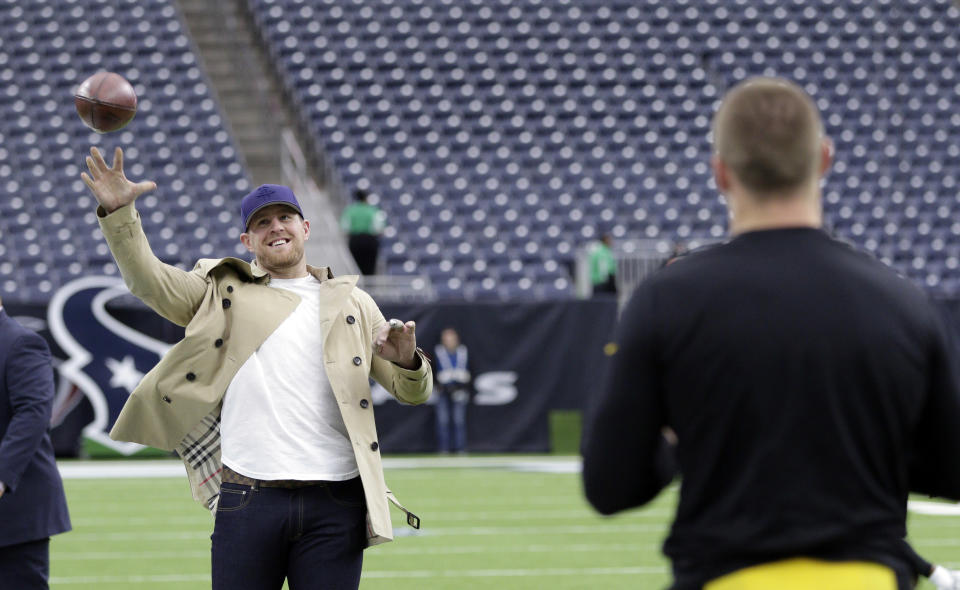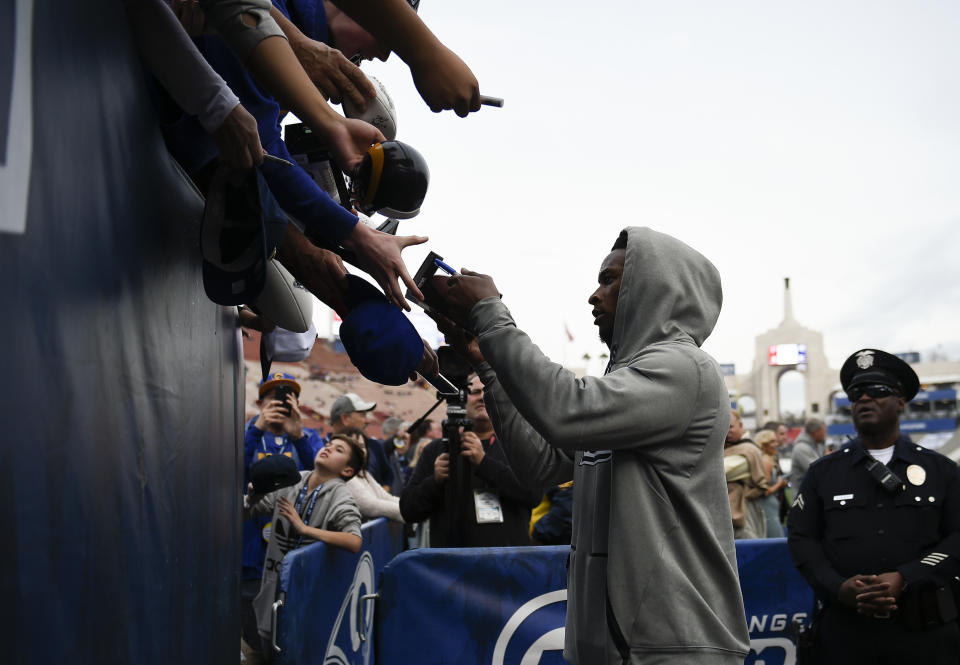NFL philanthropy was led by Watt’s charge, Gurley’s fantasy fame, Kaepernick’s spark and fans’ creativity
ORLANDO, Fla. – In one sense, this has been the best NFL season ever.
From J.J. Watt to Todd Gurley to Andy Dalton to Thomas Morstead, the 2018 season has shed new light on what players do to give back to society. The philanthropy of athletes isn’t new, but the spotlight is shining now in ways it didn’t before.
“Definitely over the last three years, you can definitely see the fans want to see what players are doing off the field,” Pro Bowl cornerback Patrick Peterson said. “I think it’s great because a lot of fans, a lot of people don’t see that.”
Everyone saw what Watt did. After feeling helpless in the wake of Hurricane Harvey’s destruction of Houston, the Texans’ defensive end made a short video from his hotel room in Dallas asking for donations to rebuild the city. What started with a modest goal of $200,000 turned into an international cause: More than 200,000 donors raised more than $37 million for Harvey relief. It was as staggering as it was uplifting.

Watt’s work stands on its own, but others also raised money and awareness in the wake of natural disasters. Dolphins linebacker Kiko Alonso raised $165,000 after Hurricanes Irma and Maria. Former Browns offensive lineman Steve Everitt raised $40,000 for the Florida Keys after Irma struck there.
Then, as the season came to a close, the giving became even more creative, and more fun.
[Stream the NFL Pro Bowl live on the Yahoo Sports mobile app]
Rams running back Todd Gurley won a lot of fantasy titles for fans around Christmas, and some paid him back by donating to Shriners Hospital for Children. That idea came from NFL reporter Michael Gehlkin, who tweeted out a list of players’ charities. Gurley’s play brought in more than $10,000 for Shriners, an amount so large that people there wondered if he had died.
“That was cool man, for them to do that,” Gurley said at NFC practice here Thursday. “I didn’t ask but they did it on their own. That means a lot. Great respect for them to do that.”
It got cooler still, as Dalton’s clutch touchdown pass in Week 17 vaulted the Bills into the playoffs for the first time since the 1999 season and Buffalo fans flooded his foundation with donations. The Dalton mania got to such a pitch that some fans had Bills jerseys fitted with his name. Former Bills punter Brian Moorman also saw a spike in donations to his foundation to help kids with life-threatening illnesses, even though he hasn’t played for the team since 2013.
Then, after the Minneapolis Miracle two weekends ago, Vikings fans gave thousands to the New Orleans-based charity of Morstead, the Saints’ punter who ambled onto the field for the final extra point despite a serious rib injury and the game out of reach.
“They’re that much more intrigued [in our charities],” Peterson said of giving fans. “I’m not sure what it is.”
It doesn’t seem to be slowing down, either. Eagles fans who felt badly about harsh treatment of some Vikings fans in Philadelphia last Sunday at the NFC title game decided to contribute to the foundation of Minnesota head coach Mike Zimmer.

Part of it is simple gratitude: the desire to do something to back a player or team, other than buying a jersey. Part of it is social media. An idea catches on, moves fast over Twitter or Facebook, and it takes only a moment to give via PayPal or GoFundMe. Part of it is trust: Watt and other players are so popular that many feel they will be more accountable and transparent than politicians. Part of it is the society in which we live, where civic awareness has spiked after a contentious presidential election in 2016.
And although many won’t admit it, part of it might be the reaction to what Colin Kaepernick started.
When the former 49ers quarterback began kneeling in protest to racial inequality and police brutality in 2016, many wanted Kaepernick and his fellow players to do something productive instead of (or besides) protesting. To say it simply: Put your money where your knee is.
That response had a couple of effects. For backers of the movement, it was a way to point out what athletes were already doing off the field. (Kaepernick pledged $1 million to several charities.) And for everyone else, it was a reason to take note of what NFL players did in their communities. It was hard not to notice when Eagles defensive end Chris Long gave his entire season’s salary away to charity.
This isn’t to say NFL players suddenly cared about causes after the kneeling began. Far from it. Watt and the others had noble instincts all along. But the social awareness topic reached every NFL city and every locker room. It was an easy transition from “What is he doing about it?” to “What am I doing about it?” And that was a question for the fans as well.
One of the kings of athlete philanthropy is Warrick Dunn. He began helping the less-fortunate as a rookie running back with the Bucs in 1997, and he dedicated his charity to his mother, a Baton Rouge police officer who was ambushed and killed while working a second job as a security guard. More than 20 years later, Dunn has built well over 100 homes for families in need.
“I don’t think you’re always born with the desire to do philanthropy,” said Dunn, who is Legends captain for the NFC this week at the Pro Bowl. “You have to go through something to understand what an issue is. You think about your life: People have helped me in my journey; they didn’t ask for anything in return. I’ve personally learned what it means to help your neighbor.”
Dunn says he applauds the current players who are taking steps to help their communities, whether because of police brutality or for other reasons. “When you have the uptick in killings, it’s time for a stance to be taken,” he says. “And do it in the right way, raising the platform for people who don’t have the platform. Take the right steps forward. Come from the conversations with solutions. Nothing with violence; we need progress.”
Behind each player’s chosen charity is a tale from his background – a reason for the desire to help. For Peterson it’s literacy. For Watt it’s his adopted hometown. For Gurley it’s kids, and impoverished families in North Carolina, where he went to high school. He gets inspiration from them as he gives back to them.
“Food banks feed hundreds and hundreds a day,” he said. “It means a lot more to them and their families, to help and give back.”
Although when he was asked if he wanted fantasy points as a way to raise money for his charity, Gurley paused.
“That’s a good question,” he said. “Nah, I don’t care about fantasy that much.”
More NFL on Yahoo Sports

